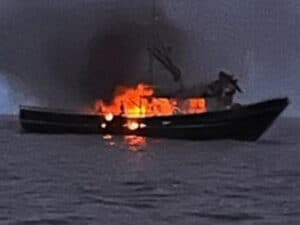
NYK starts research aimed at manned autonomous vessels
Written by Nick Blenkey
Ultimate aim is an advanced CBM where AI monitors machinery condition for entire fleet
Japan’s NYK Group has reached joint research agreements aimed at developing advanced condition-based maintenance (CBM) management processes for ship machinery, and has started verification of data during actual ship operations.
Machinery plant data from multiple sensors will be shared and monitored with the classification society and machinery manufacturers in real time.
NYK Group plans to use this data and real-time monitoring to develop an advanced CBM for use in manned autonomous vessels. These will make use of advanced technologies and remote support from the home office to support ship operations and enhance safety.
.
Currently, the shipping industry generally uses time-based maintenance (TBM). This requires a vessel to halt operations for a few weeks of inspections every two or three years, even if no fatigue or breakdown of the engine is observed. In addition, unexpected failures can occur during voyages and cause long delays.
Recent developments in information and communication technology mean that large amounts of data can be transmitted between ship and shore. The NYK Group has utilized these advances to focus on CBM and to conduct research on optimal maintenance. It has now decided to boost its research by partnering with the Monohakobi Technology Institute (MTI), ClassNK and machinery manufacturers — Japan Engine Corporation in the case of engines and Mitsubishi Heavy Industries Marine Machinery & Equipment Co in the case of steam turbines.
OUTLINE OF JOINT RESEARCH
Ships will be installed with SIMS2 (an information management system developed by NYK and MTI that allows data-sharing among workplaces on shore and at sea in real time) plus a new sensor and equipment in two different types of main engine and main steam turbine. Detailed operational data such as vibration and temperature of bearing will be collected. The condition of the engine will then be shared and constantly monitored by the classification society and engine manufacturers.
The project will also work to make predictions of machinery failure and remaining useful life (RUL) by taking advantage of manufacturer expertise to create optimal CBM guidelines and to then verify them on actual ships.
These results will be shared with the classification society to establish a new classification survey scheme based on CBM.
In the future, NYK aims to develop more advanced CBM that enables continuous monitoring of the condition through AI (artificial intelligence), and then realizeof further optimal maintenance by combining information such as operational schedules.
NYK says establishing an advanced CBM system is a step toward a highly automated vessel, and thus an autonomous one.




